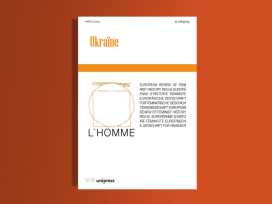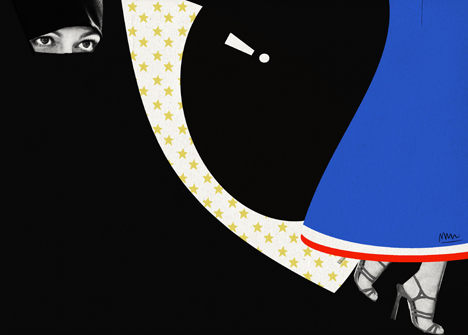Jaroslaw Kuisz: Your books are an intellectual warning to western societies. Yet, even well-known intellectuals seem not to understand correctly your message. Let me give you just one example. Alain Finkielkraut, responding to your opinion that France is giving in to Islamophobia, said that you do not take the problem of violence against women into account and that you treat “the question of Islam in Europe as if it was just another chapter of European xenophobia”. In his view, “one cannot get rid of historical memory, yet to systematically compare the current situation to that in the 1930s is an ideology.” How could you comment on such a statement?
Martha Nussbaum: Well, he does not really engage with the arguments in my book, so it is rather difficult to respond. I set forth five arguments used to support the ban on the Muslim burqa, and I then show that each of these, if applied consistently and without bias, would lead to bans on numerous practices in the majority culture. I would like to hear his response to those actual arguments. Also, to say that I ignore violence against women is absurd, when most of my career has been devoted to condemning that. Many times I explicitly stated not only that any use of physical force or the threat of force used to make a woman wear religious dress should be illegal but also that laws against domestic violence and child abuse should be enforced much more zealously than they are.
JK: Is violence against women a problem that is particularly pressing in the Muslim culture?
MN: Not at all. There is a lot of data that proves that majority Euro-American cultures are full of violence against women.
JK: What if a woman is not forced to follow strict religious rules but claims to choose to do so voluntarily?
MN: That is a very different matter. There may be peer pressure, but there is also peer pressure to wear mini-skirts, to get breast implants, and all sorts of practices through which in the majority culture women market themselves as commodities for male consumption. Should those practices be illegal?
JK: And what about emotional pressure?
MN: Perhaps some young women wear religious dress because of emotional pressure in their families, but it is also present in our culture. I was told by my father that he would not pay for my college education if I appeared in public in any group that contained African-Americans. That was surely emotional pressure of a most unpleasant sort, but I don’t think it should have been illegal. Parents put pressure on their children all the time in ways that might be unpleasant or immoral, but for government to constantly interfere would be too much of an intrusion into the private life.
It is so funny, by the way, that Finkielkraut thinks that a free woman has to wear a skirt. When I was a young leftist feminist, we thought we should never wear skirts, because that was marketing ourselves for male consumption. We were committed to wearing only pants. I never paid much attention to this, since personally I like skirts, but that was the feminist position.
JK: In reaction to the crisis of 2008, many intellectuals started playing with the idea of some kind of revolutionary change of the whole “system”. They seemed to rely not only on the youth and different Occupy movements but also on some works of Marx and his followers, which hastily had the dust shaken off them. You go deliberately against this fashionable intellectual wave and prefer to study thoroughly John Rawls in order not to overthrow political principles and institutions but to make them… more stable. How would you explain such a difference in approach?
MN: I have always found Rawls’ thought to be illuminating. For me he is the greatest political thinker of the twentieth century maybe because I’ve always been a liberal social democrat, never a Marxist. While all my friends were joining Marxist groups in the 1970s, I was licking stamps for Eugene McCarthy, anti-war liberal senator from Minnesota and a presidential candidate. I’ve always favoured free public deliberation and incremental change. The challenge I took on in my book was to say how a political culture of the emotions can be consistent with the robust protection of freedom of speech and public debate.
JK: At the moment, however, many radical opponents of the idea of political correctness tend to present themselves as defenders of freedom of speech. How much negative emotion is, in your opinion, acceptable in a liberal democracy? Or perhaps this is not a question of emotions themselves, but of (un)acceptable manifestations of these feelings?
MN: A lot of the debate in this area strikes me as crude, because it does not distinguish between social norms and laws. I believe that virtually no speech should be illegal, with the exception of obvious examples such as bribery, perjury and misleading advertising.
However, not everything that is legal is appropriate, and each sphere of society has its own internal norms. The New York Times will not print racist slurs; a university classroom needs to enforce norms of civility; and so forth. What is referred to as “political correctness” is just civility. You cannot create an educational environment if the different groups feel free to insult one another all the time. Sometimes people don’t realize that what they are in the habit of saying is insulting to some groups, and that is why they are annoyed at the suggestion that they should not say it. “Political correctness” is therefore just a demand for empathetic understanding of other viewpoints, which surely can’t be bad in a classroom, or a political debate.
JK: In many countries, liberal public opinion really is reluctant to use a vocabulary that leads to any kind of jingoism. Even patriotic feasts are treated with caution, for they could be turned into a manifestation of a dangerous type of nationalism. What is your idea of modern patriotism and is such thing as a liberal patriotism possible today?
MN: Well, if liberals cede the strong emotions of patriotism to their opponents, they are making a bad mistake. I do not think that patriotism – which I define as a strong emotion, a form of love, taking the nation as object – needs to be linked to any form of domineering nationalism. Indeed my book is full of examples in which liberal patriotism leads people to attach themselves to globalism. Lincoln, Franklin Delano Roosevelt, Gandhi, these people were all in favour of universal love. But they thought that love needs to begin with what is familiar and visible, and all believed that nations play a crucial role in building a just world. There’s no reason why that sort of liberal patriotism could not be possible these days.
JK: Yet all the examples of liberal patriots you just mentioned are great figures from the past…
MN: I don’t use very many present-day examples because I feel that we don’t yet have enough distance from them to analyse them properly. I stop around the time India regained independence for that reason. But in my discussions of cities and public art, I do cite examples from Chicago in my time, showing how sculpture, music and architecture all contribute to support for good values. There’s nothing about today’s world that makes the project I describe inherently impossible. The dominance of television and the Internet does, however, create new challenges.
JK: What should the teaching of critical patriotism look like – especially in a world where the humanities are being constantly marginalized in schools and universities? Whose responsibility is this going to be – private universities or NGOs, intellectual communities?
MN: I think this varies a lot from country to country. In some places, the ideals of critical thinking and humanistic imagination are still quite strong. I’d say this is true in Scotland, South Korea, Ireland, to some extent Germany and the Netherlands, and in the US, at least at the university level. Of course there is always a struggle, but we are fighting! I think it is the responsibility of humanities faculties to articulate the importance of their mission, and this is not always done well. Private funding can sometimes help, and it indeed has helped in Germany and in Britain, but the donors must not be allowed to dictate the curriculum. There must be clear norms of faculty autonomy and faculty control over hiring and content.
JK: You support an idea that love is needed not only in an ideal society but, even more urgently, now in real, imperfect societies that aspire to justice. What is the role of love in law and politics? Doesn’t it bring with it the danger of political kitsch?
MN: Sure, there are infinitely many types of love, and some are good and some bad. I make it very clear that a specific set of political norms – including support for health, education, and welfare, and including equal respect among differing groups – is the starting point. Then the argument is that these norms will not remain stable without a particular type of love, which includes compassion but is somewhat stronger than compassion is usually taken to be. Only love will make people willing to sacrifice their own self-interest for the sake of the well-being of others, as my norms require. Of course, this love must limit other narrower types of love: family love is basically good, but it can lead people to want their own children to do better than other people’s children, and a just society primarily through taxation tax system limits how much people give to their own children. If love is portrayed in a kitschy way, it won’t work, so that is why I talk about great artists.
JK: Do you really think this can help? Nowadays the idea of a European “Sozialstaat”, of a welfare state, seems to turn into a nation-state that closes its borders to immigrants. It seems as if we have a choice between being an “open society” that is poorer and a “closed society” that is more wealthy; and that, without much hesitation, we chose the latter. What is your opinion on the paradoxical development of the welfare state that the Europeans are so afraid to lose?
MN: I think societies have a right to limit the number of immigrants they admit, and in a sense they also have a duty to do so, for the reason you give: that the continuity of good norms requires not too sudden an influx of people who haven’t learned the same norms. Some countries go to an unpleasant extreme: Finland, with its extremely high living standard could and should admit many more immigrants, yet they seem afraid of losing homogeneity. In most of Europe, however, you see profound hypocrisy: the populations are in decline, so immigrants are needed to make up the workforce, and they are admitted – and then treated badly, as if they do not belong. It’s like inviting guests to a dinner and then throwing them rotten food.
JK: In your book you argue that “the tendency toward stigmatizing and excluding others is present in human nature itself, and is not an artefact of a defective history”. To what extent does this belief shape your vision of liberalism?
MN: It is quite important. I used to think that there was no such thing as “original sin”, but now I think that there is something that Kant rightly called “radical evil”, a tendency to behave selfishly and hierarchically and that is not the outgrowth of culture. Recent psychological research supports this. I’ve spent a lot of time working on the emotion of disgust, and I do think that it has altered my views. It means that racism, however irrational it is, is likely to be present in some form in all societies, and that we must constantly struggle against it.
JK: You are not only a great supporter of minority rights, but also of the feminist cause. How would you describe how your concepts from Political Emotions could work in the field of up-to-date feminism?
MN: Well, I don’t even know what you mean by “up-to-date feminism”. These things vary so much by country. Italy favours what’s known as “difference feminism”, in other countries postmodern feminism is popular. I have my own type of feminism, which is both liberal – committed to individual expression and self-development in the manner of J.S. Mill – and also radical, prepared to criticize hierarchies of gender, race and sexuality. I also like some contributions of “queer theory”, for their insistence on exposing the sheer irrationality of many socially constructed norms. I actually think that Mill already had all these insights. I would quite like to meet him.
JK: Why him of all others?
MN: Mill’s “The Subjection Of Women” tells more important truths than almost any other philosophical book. In addition to being an intrinsically interesting person, he would be likely to be interested in talking to me, and that is not the case with other philosophers of the past, almost none of whom took women seriously.
This article first appeared in a series of issues of Kultura Liberalna, in cooperation with the The Centre for French and Francophone Studies at the University of Warsaw.







